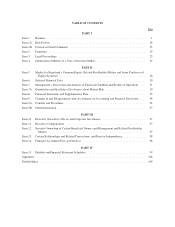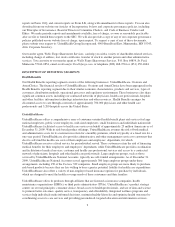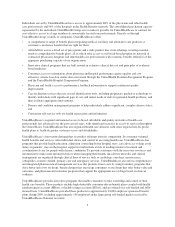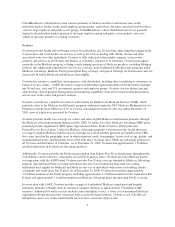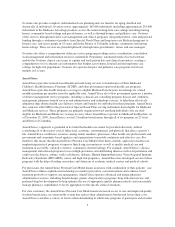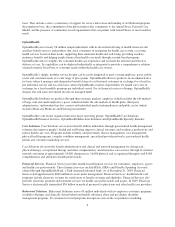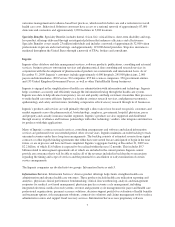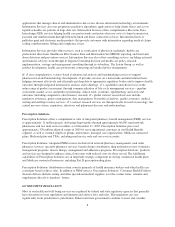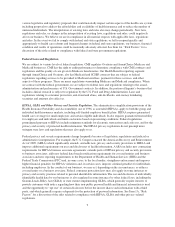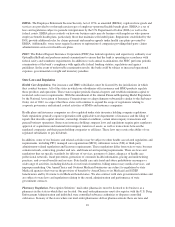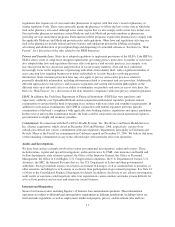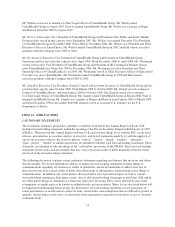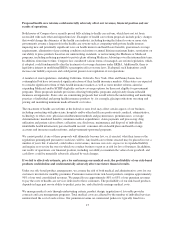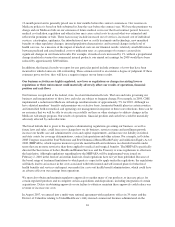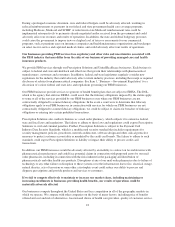United Healthcare 2009 Annual Report Download - page 12
Download and view the complete annual report
Please find page 12 of the 2009 United Healthcare annual report below. You can navigate through the pages in the report by either clicking on the pages listed below, or by using the keyword search tool below to find specific information within the annual report.ERISA. The Employee Retirement Income Security Act of 1974, as amended (ERISA), regulates how goods and
services are provided to or through certain types of employer-sponsored health benefit plans. ERISA is a set of
laws and regulations subject to periodic interpretation by the U.S. Department of Labor (DOL) as well as the
federal courts. ERISA places controls on how our business units may do business with employers who sponsor
employee benefit health plans, particularly those that maintain self-funded plans. Regulations established by the
DOL provide additional rules for claims payment and member appeals under health care plans governed by
ERISA. Additionally, some states require licensure or registration of companies providing third-party claims
administration services for health care plans.
FDIC. The Federal Deposit Insurance Corporation (FDIC) has federal regulatory and supervisory authority over
OptumHealth Bank and performs annual examinations to ensure that the bank is operating in accordance with
federal safety and soundness requirements. In addition to such annual examinations, the FDIC performs periodic
examinations of the bank’s compliance with applicable federal banking statutes, regulations and agency
guidelines. In the event of unfavorable examination results, the bank could be subject to increased operational
expenses, governmental oversight and monetary penalties.
State Laws and Regulation
Health Care Regulation. Our insurance and HMO subsidiaries must be licensed by the jurisdictions in which
they conduct business. All of the states in which our subsidiaries offer insurance and HMO products regulate
those products and operations. These states require periodic financial reports and establish minimum capital or
restricted cash reserve requirements. With the amendment of the Annual Financial Reporting Model Regulation
by the National Association of Insurance Commissioners to adopt elements substantially similar to the Sarbanes-
Oxley Act of 2002, we expect that these states will continue to expand the scope of regulations relating to
corporate governance and internal control activities of HMOs and insurance companies.
Health plans and insurance companies are also regulated under state insurance holding company regulations.
Such regulations generally require registration with applicable state departments of insurance and the filing of
reports that describe capital structure, ownership, financial condition, certain intercompany transactions and
general business operations. Some state insurance holding company laws and regulations require prior regulatory
approval of acquisitions and material intercompany transfers of assets, as well as transactions between the
regulated companies and their parent holding companies or affiliates. These laws may restrict the ability of our
regulated subsidiaries to pay dividends.
In addition, some of our business and related activities may be subject to other health care-related regulations and
requirements, including PPO, managed care organization (MCO), utilization review (UR) or third-party
administrator-related regulations and licensure requirements. These regulations differ from state to state, but may
contain network, contracting, product and rate, and financial and reporting requirements. There are laws and
regulations that set specific standards for delivery of services, payment of claims, adequacy of health care
professional networks, fraud prevention, protection of consumer health information, pricing and underwriting
practices, and covered benefits and services. State health care anti-fraud and abuse prohibitions encompass a
wide range of activities, including kickbacks for referral of members, billing unnecessary medical services, and
improper marketing. Our AmeriChoice and Ovations Medicaid businesses are subject to regulation by state
Medicaid agencies that oversee the provision of benefits by AmeriChoice to its Medicaid and SCHIP
beneficiaries and by Ovations to its Medicaid beneficiaries. We also contract with state governmental entities and
are subject to state laws and regulations relating to the award, administration and performance of state
government contracts.
Pharmacy Regulation. Prescription Solutions’ mail order pharmacies must be licensed to do business as a
pharmacy in the state in which they are located. Our mail order pharmacies must also register with the U.S. Drug
Enforcement Administration and individual state controlled substance authorities to dispense controlled
substances. In many of the states where our mail order pharmacies deliver pharmaceuticals there are laws and
10


